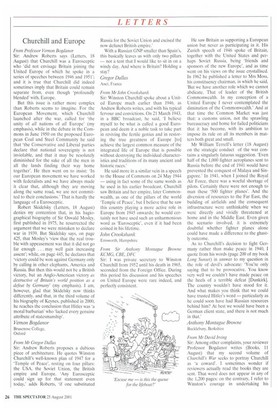From Sir Anthony Montague Browne KCMG, CBE, DFC Sir: I
was private secretary to Winston Churchill from 1952 until his death in 1965, seconded from the Foreign Office. During this period his discussion and his speeches on United Europe were rare indeed, and perfectly consistent. He saw Britain as supporting a European union but never as participating in it. His Zurich speech of 1946 spoke of Britain, together with the United States and perhaps Soviet Russia, being 'friends and sponsors of the new Europe', and as time went on his views on the issue crystallised. In 1962 he published a letter to Mrs Moss, his constituency chairman, in which he said, 'But we have another role which we cannot abdicate. That of leader of the British Commonwealth. In my conception of a United Europe I never contemplated the diminution of the Commonwealth.' And at that time the Common Market was just that: a customs union, not the sprawling bureaucracy and home for failed politicians that it has become, with its ambition to impose its rule on all its members in matters both great and small.
Mr William Terrell's letter (18 August) on the strategic conduct of the war contains a singularly fatuous suggestion. 'Even half of the 1,000 fighter aeroplanes sent to Russia before the end of 1941 would have prevented the conquest of Malaya and Singapore.' In 1941, when I joined the Royal Air Force, there was a woeful shortage of pilots. Certainly there were not enough to man these '500 fighter planes'. And the diversion of resources to the Far East, the building of airfields and the consequent infrastructure were unthinkable when we were directly and vividly threatened at home and in the Middle East. Even given the scenario involved, it is extremely doubtful whether fighter planes alone could have made a difference to the ghastly outcome.
As to Churchill's decision to fight Germany rather than make peace in 1940, I quote from his words (page 200 of my book Long Sunset) in answer to my question in the role of devil's advocate: 'You're only saying that to be provocative. You know very well we couldn't have made peace on the heels of a terrible defeat [Dunkirk]. The country wouldn't have stood for it. And what makes you think that we could have trusted Hitler's word — particularly as he could soon have had Russian resources behind him? At best we would have been a German client state, and there is not much in that.'
Anthony Montague Browne
Bucklebury, Berkshire


























































 Previous page
Previous page